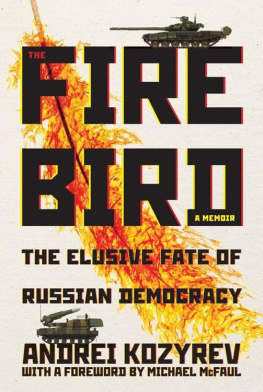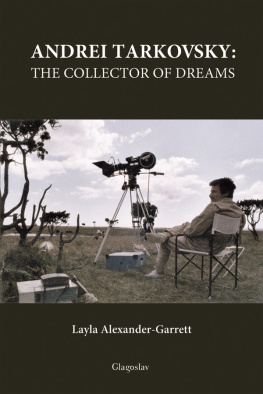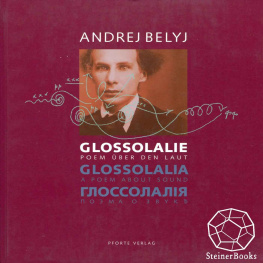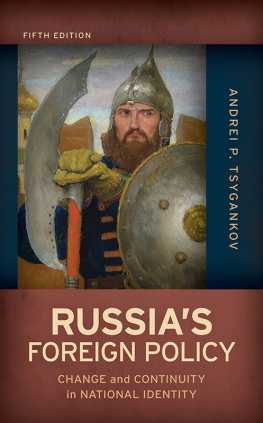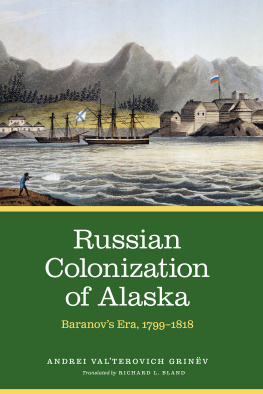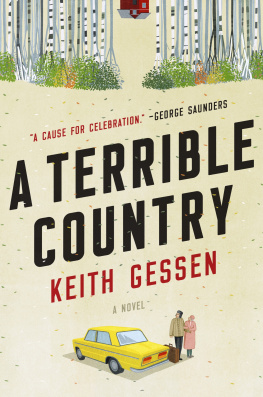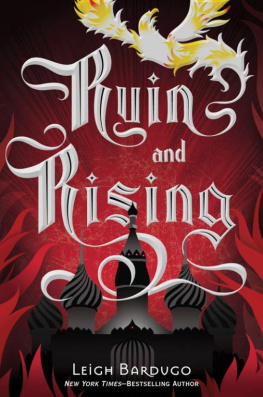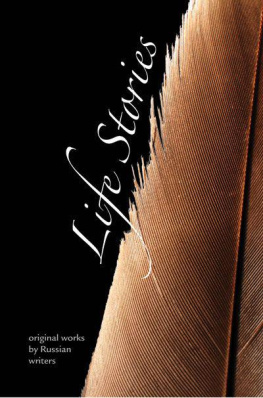Andrei Kozyrev - The Firebird: The Elusive Fate of Russian Democracy
Here you can read online Andrei Kozyrev - The Firebird: The Elusive Fate of Russian Democracy full text of the book (entire story) in english for free. Download pdf and epub, get meaning, cover and reviews about this ebook. year: 2019, publisher: University of Pittsburgh Press, genre: Politics. Description of the work, (preface) as well as reviews are available. Best literature library LitArk.com created for fans of good reading and offers a wide selection of genres:
Romance novel
Science fiction
Adventure
Detective
Science
History
Home and family
Prose
Art
Politics
Computer
Non-fiction
Religion
Business
Children
Humor
Choose a favorite category and find really read worthwhile books. Enjoy immersion in the world of imagination, feel the emotions of the characters or learn something new for yourself, make an fascinating discovery.
- Book:The Firebird: The Elusive Fate of Russian Democracy
- Author:
- Publisher:University of Pittsburgh Press
- Genre:
- Year:2019
- Rating:4 / 5
- Favourites:Add to favourites
- Your mark:
- 80
- 1
- 2
- 3
- 4
- 5
The Firebird: The Elusive Fate of Russian Democracy: summary, description and annotation
We offer to read an annotation, description, summary or preface (depends on what the author of the book "The Firebird: The Elusive Fate of Russian Democracy" wrote himself). If you haven't found the necessary information about the book — write in the comments, we will try to find it.
The Firebird: The Elusive Fate of Russian Democracy — read online for free the complete book (whole text) full work
Below is the text of the book, divided by pages. System saving the place of the last page read, allows you to conveniently read the book "The Firebird: The Elusive Fate of Russian Democracy" online for free, without having to search again every time where you left off. Put a bookmark, and you can go to the page where you finished reading at any time.
Font size:
Interval:
Bookmark:
RUSSIAN AND EAST EUROPEAN STUDIES
Jonathan Harris, Editor

A MEMOIR
THE ELUSIVE FATE OF RUSSIAN DEMOCRACY
ANDREI KOZYREV
WITH A FOREWORD BY MICHAEL MCFAUL
UNIVERSITY OF PITTSBURGH PRESS
Published by the University of Pittsburgh Press, Pittsburgh, Pa., 15260
Copyright 2019, University of Pittsburgh Press
All rights reserved
Manufactured in the United States of America
Printed on acid-free paper
10 9 8 7 6 5 4 3 2 1
Cataloging-in-Publication data is available from the Library of Congress
ISBN 13: 978-0-8229-4592-5
ISBN 10: 0-8229-4592-4
Cover art: Alexander Popatov/Shutterstock.com
Cover design: Alex Wolfe
ISBN-13: 978-0-8229-8723-9 (electronic)
To Natalia and Andrei, my children
Michael McFaul
I FIRST MET RUSSIAN FOREIGN MINISTER ANDREI KOZYREV in 1990, when the Soviet Union still had a foreign minister of its own, Eduard Shevardnadze. I was part of an American delegation in Moscow that was conducting a workshop on democracy on behalf of the National Democratic Institute, so we decided to pay a courtesy call to this newly appointed official in Boris Yeltsins government. Obviously, his job description at the time was eccentric. He was the foreign minister for the Russian Republic, one of fifteen republics that constituted the Soviet Union. It was the equivalent of being the foreign minister of California. At that time the fate of the Soviet Union was not certain; the job therefore of the Russian foreign minister was ambiguous.
Minister Kozyrev made a huge positive impression on me and on our delegation as a whole. His commitment to democratic reforms at home and closer relations with the West were obvious. As a PhD student at Oxford at the time, writing about Soviet and American policies toward southern Africa, I actually had read some of Andreis written work before our meeting. Seeing opportunity in Gorbachev's policies of glasnost and perestroika, he boldly published articles repudiating the Soviet construct of international class struggle as the basis for its foreign policy and was especially criticalof Soviet adventurism in what was called back then the Third World. In person, he was even more impressive. He was not trying to find a third way between Soviet communism and Western democracy; he was seeking to join the West. Kozyrev embraced the audacious idea that Russians would be better off as partners of the United States and as citizens of Europe. I could trace no lingering legacy at all of Cold War thinking in his fresh, blunt, and candid assessment of the possibilities of collaboration between our two countries. I remember leaving that meeting with the following thought: if Russian Foreign Minister Kozyrev someday does become the Soviet foreign minister, we have a real chance of ending the Cold War for good.
Andrei Kozyrev, however, never became the Soviet foreign minister. Instead, he was part of a circle of other young reformers around Boris Yeltsin who helped to bring down the Soviet Union. Disillusion with outmoded Soviet ways and an emerging aspiration toward liberal-democratic ideals was their shared calling card. From the summer of 1990 until the summer of 1991, the Soviet government and the Russian government dueled over divergent visions for the future of the country. In August 1991 this standoff precipitated an inflection moment when a group of hard-liners within the Soviet government placed Soviet President Mikhail Gorbachev under house arrest and attempted a coup. Yeltsin and his supporters resisted. Kozyrev was in the Russian White Housethe home of the Russian government at the timewhen the Soviet Armed Forces moved to seize the building during this coup attempt. He was present when Boris Yeltsin defiantly stood on a tank to address the crowd that had gathered to support the Russian government against the coup plotters. After three tumultuous days, the coup failed and momentum for Soviet dissolution accelerated. Kozyrev then participated in the secret negotiations at Brezhnevs former hunting lodge deep in the primeval forest of Belovezha, Belarus, where the leaders of the Soviet republics of Russia, Ukraine, and Belarus agreed to secede, recognize each others sovereignty, and dissolve the Soviet Union to form a new Commonwealth of Independent States. Instead of becoming Soviet foreign minister, Andrei Kozyrev became the first foreign minister of a newly independent Russia, a position in which he served for five years.
The first months after the failed August 1991 coup were filled with optimism, both in Russia and the West. At the time, Time magazine trumpeted, Serfdoms End: A Thousand Years of Autocracy Are Reversed. However it may look in hindsight, this hopeful sentiment was not unusual. Leaders fromthe democratic world embraced the new government in Moscow, and Andrei Kozyrev was their perfect interlocutor. As someone who not only clearly identified with the reformers in Yeltsins government but also had been educated at the Institute of International Relationsthe Soviet training academy for grooming new diplomats and held previous experience in the Soviet foreign ministry, Kozyrev had the perfect mix of skills, ideas, and experience to serve a newly independent Russia as its top diplomat at this crucial moment in history. For five years Kozyrev pursued Russias national interest on the global stage honorably and capably.
At home, however, the transitions from communism to capitalism and from autocracy to democracy were extremely painful. During the 1990s Russians endured major and sustained economic depression, much worse than Americans experienced in the 1930s. The same White House that Kozyrev helped to defend in August 1991 was again attacked by tanks in October 1993, this time not by enemies of the Russia state but by the president of Russia himself, Boris Yeltsin. The causes of this standoff between the Russian president and parliament in 1993 were complicated; there were no white hats and black hats in this catastrophe. But tragically, if understandably, few Russians could draw inspiration about the practice of democracy from these political events, especially against the backdrop of economic collapse. These intertwined political and economic outcomes laid waste to Russias democratic aspirations and opened a path for the eventual return of authoritarian rule.
As someone firmly identified with Yeltsin and the market reformers, Foreign Minister Kozyrev became an increasingly unpopular figure in Russia. Of course, Kozyrev himself had no direct responsibility for either the economy or domestic politics, but the reputation of everyone in Yeltsins government at the time suffered. As he discusses in the pages of this book, Kozyrev himself became frustrated by Yeltsins increasingly chaotic behavior, and he therefore decided to step down from his position as foreign minister in 1996 after successfully running for a seat in the new Russian parliament. As a member of parliament, Kozyrev continued to argue for closer engagement with the West. After one term he retired from political life and pursued a career in the private sector, later settling in the United States.
Kozyrevs memoir represents a significant contribution to our understanding of the first years of Russian independence. As we now move past the twenty-fifth anniversary of the collapse of the Soviet Union, USRussianrelations are at a level of hostility in some ways more intense than during the twilight years of the Cold War. This new conflict has its origins in the events of the early post-Soviet erain exactly the handful of years that Kozyrev is crucially positioned to shed light on. He provides an account as one who witnessed, from the highest levels of independent Russias first government, how the international conflicts contributing to this renewed EastWest confrontation first took root in confusion and misunderstanding. In tracing the origins of the most intractable problems that now lay at the heart of our new confrontational era in USRussian relations, Kozyrev reveals how in 1992 he denounced the hard-line Russian security and military forces that were fueling regional conflicts in Georgia, Moldova, Karabakh, and Crimea. These would later solidify as Putins aggression and frozen conflicts on Russias periphery today.
Font size:
Interval:
Bookmark:
Similar books «The Firebird: The Elusive Fate of Russian Democracy»
Look at similar books to The Firebird: The Elusive Fate of Russian Democracy. We have selected literature similar in name and meaning in the hope of providing readers with more options to find new, interesting, not yet read works.
Discussion, reviews of the book The Firebird: The Elusive Fate of Russian Democracy and just readers' own opinions. Leave your comments, write what you think about the work, its meaning or the main characters. Specify what exactly you liked and what you didn't like, and why you think so.

